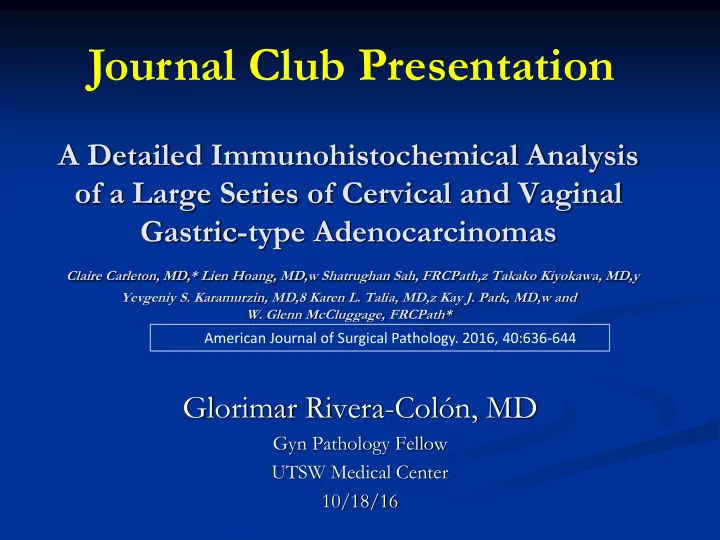

Journal Club Presentation A Detailed Immunohistochemical Analysis of a Large Series of Cervical and Vaginal Gastric-type Adenocarcinomas Claire Carleton, MD,* Lien Hoang, MD,w Shatrughan Sah, FRCPath,z Takako Kiyokawa, MD,y Yevgeniy S. Karamurzin, MD,8 Karen L. Talia, MD,z Kay J. Park, MD,w and W. Glenn McCluggage, FRCPath* American Journal of Surgical Pathology. 2016, 40:636-644 Glorimar Rivera-Colón, MD Gyn Pathology Fellow UTSW Medical Center 10/18/16
Introduction
Gastric Type Mucinous Adenocarcinoma of Cervix (GTMAC) • Uncommon subtype of non HPV-related cervical adenocarcinoma. • Probably under-recognized • Spectrum of differentiation • Minimal deviation adenocarcinoma (MDA)/ adenoma malignum • Very well-differentiated form • GTMAC • Poorly differentiated form
• Overlapping morphologies MDA with GTMAC • Atypical foci may be present in MDA • Expression of HIK1083 and MUC6 • Pyloric gland mucin recognition • Molecular evidence ( McCluggage et al. 2010 ) • Clonally related (extra copy of ch 7)
• Aggressive clinical behavior. • Spread beyond cervix at diagnosis • Ovary, peritoneum, omentum • Morphology overlap with pancreatobilliary adenocarcinomas
Study Methods
21 BHSCT 47 Cases 26 MSKCC 45 Cx 2 Va 3 Adenoma Malignum
Examples of GTMAC
Findings
2 block type/ HPV -
FIGURE 2. Gastric-type adenocarcinomas exhibiting diffuse positivity with CK7 (A), focal positivity with CK20 (B), diffuse positivity with CEA (C), diffuse positivity with CDX2 (D), diffuse positivity with CA19.9 (E), and focal positivity with CA125 (F).
FIGURE 3. Gastric-type adenocarcinomas exhibiting focal cytoplasmic positivity with MUC6 (arrow) (A) and diffuse positivity with CAIX (B).
FIGURE 4. Gastric-type adenocarcinomas exhibiting diffuse nuclear positivity with PAX8 (A) and HNF1b (B).
FIGURE 5. Some gastric-type adenocarcinomas exhibit “mutation - type” staining, either of diffuse (A) or “null” type (B), with p53.
FIGURE 6. Gastric-type adenocarcinomas exhibiting negative (A) and diffuse “block - type” immunoreactivity (B) with p16.
Key Points of Discussion
• Unusual type of cervical adenocarcinoma • Significantly different morphologic appearances from the usual HPV-related cervical adenocarcinomas. • Gastric markers • MUC6 (81% + more often focal) • CAIX (83% + more often focal) • HIK1083 not tested • Most usual HPV related are CK7 +; CK20 -; CDX2 - while in this study all GTMAC were CK7 and C19-9 + and CK20 (49 %) ; CDX2 (51%) • CK7; CEA; CA19.9, CA125 usually + and CK20, CDX2 +/_: may not distinguish GTMAC from pancreatobilliary
• PAX2 in a previous study was positive in all lobular endocervical glandular hyperplasia (a presumed precancerous lesion of GTMAC) and negative in all cases of MDA. • This study showed only 5% of GTMAC cases positive for PAX2 suggesting lost during the developmental of GTMAC • Spectrum of benign, premalignant and malignant cervical glandular lesions with gastric diff showing ER/PR negativity. This study showed GTMAC also negative ER/PR. • Clear cell carcinoma (CCC) is in the differential. HNF1B has been + in CCC as well as in this study for GTMAC. However, Napsin A and p504 were not tested.
• P53 has no diagnostic value, but may be involved in carcinogenesis. • P16 has no diagnostic value, although it can be diffusely positive. But all GTMAC are negative for HPV. • HER2 was mostly negative suggesting that it is unlikely that inhibitors such as trastuzumab will be effective. • MMR pathway is not commonly involved in GTMAC.
Comments
2014 WHO Classification of Cervical Adenocarcinoma Endocervical adenocarcinoma in situ (AIS), usual type Cervical adenocarcinoma, usual type Mucinous carcinoma Gastric type (including minimal deviation) Intestinal type Signet ring cell type Villoglandular carcinoma Endometrioid carcinoma Clear cell caricnoma Serous carcinoma Mesonephric carcinoma Adenocarcinoma admixed with neuroendocrine carcinoma
Mucinous Carcinoma of Cervix Gastric type Minimal deviation = well differentiated All other grades = gastric type Intestinal type Signet ring cell type
What is the Definition of “Mucinous”? Morphology Mucins H&E Stains Apperance Normal Acid mucin Blue-grey endocervix Neutral mucin Usual type Mucin depleted Minimal cacinoma or very much eosinophilic reduced Gastric type Neutral mucin Clear/pale MUC6 carcinoma (pyloric type) eosinophilic HIK1083 Intestinal type Intestinal mucin Goblet cells CDX2 caricnoma
Normal endocervical and gastric glands
Gastric differentiation/Pyloric Metaplasia HIK1083
Gastric Type Cervical Adenocarcinoma Main features Tumor cells with abundant clear to eosinophilic cytoplasm Distinct cell membranes Pyloric mucin markers: MUC6 and HIK1083 Usually not associated with HPV, nor with usual type AIS. P16 negative or patchy. Uncommon, but up to 25% of cx adenoca in Japan (unknown reasons) Some patients have Peutz Jeghers syndrome (STK11 mutation) Worse prognosis than usual type adenoca
Gastric type mucinous adenocarcinoma of cervix (GTMAC)
GTMAC
GTMAC
GTMAC HIK1083 p16
GTMAC CK7 CK20 CEA CDX2 Carleton et al., American Journal of Surgical Pathology. 2016, 40:636-644
Minimal Deviation Adenocarcinoma (MDA)
MDA
MDA Oddly angled simple glands Focal desmoplastic stroma
MDA
MDA Peng et al., Int J Clin Exp Pathol, 2015, 8: 5877-82
Precursor Lesions of GTMAC Not usual type adenocarcinoma in situ Possible atypical lobular endocervical glandular hyperplasia (LEGH) LEGH Macro: circumscribed collection of cysts near the cervical os Micro: well demarcated proliferation of glands, sometimes surrounding a center duct; abundant clear to eosinophilic cytoplasm with bland nuclei Rare benign finding with possible watery discharge in 3 rd to 7 th decade
LEGH Mikami and McCluggage. Advances in Anatomic Pathology. 2013, 20:227-237.
LEGH HIK1083 Mikami and McCluggage. Advances in Anatomic Pathology. 2013, 20:227-237.
FIGURE 6 Atypical LEGH 2
FIGURE 7 Gastric type AIS p16 HIK1083 2 Mikami and McCluggage. Advances in Anatomic Pathology. 2013, 20:227-237.
MDA and GTMAC in a single case Peng et al., Int J Clin Exp Pathol, 2015, 8: 5877-82
Possible carcinogenesis of GTMAC Gastric Metaplasia LEGH Gastric AIS Atypical LEGH ? GTMAC MDA ?
Thank You!
Recommend
More recommend